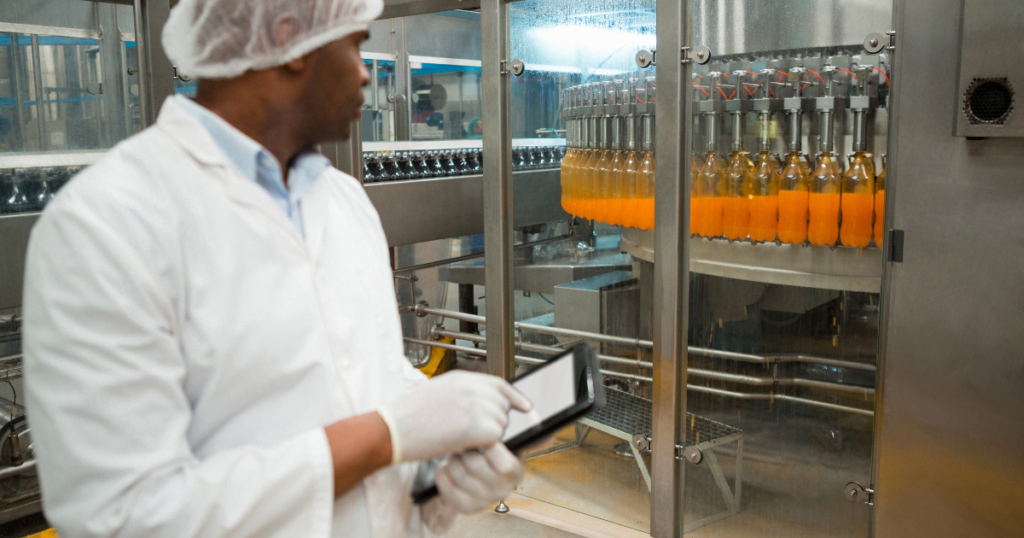A contaminated product or quality issue can quickly escalate from an isolated incident to a viral crisis, potentially causing consumer illnesses, costly product recalls, and long-term damage to brand credibility. Hence, quality control is essential for manufacturers in the food industry.
For food manufacturers, every product that reaches a consumer’s table carries an implicit promise of safety, consistency, and excellence. With adequate quality control, manufacturers can guard this promise and maintain integrity.
Effective quality control (QC) in the food and beverage sector demands a comprehensive and proactive approach. This begins with the procurement process and continues through the production process until the products leave the production line.
This article explores the best practices and industry standards for maintaining food safety and quality, offering insights for food industry stakeholders.

Importance of Strict Control in the Food Industry
The food industry operates in a high-stakes environment where one lapse in quality can devastate a brand’s reputation overnight. This is why quality control is non-negotiable.
With robust quality control measures, businesses can;
Reduce Production Costs and Maximize Efficiency
Effective quality control is a powerful tool for cost management. By meticulously monitoring production processes, companies can minimise waste by preventing the production of substandard products. When quality control is prioritised, it reduces inefficiencies and enhances overall profitability.
Build and Protect Brand Reputation
In today’s hyper-connected digital landscape, a brand’s reputation is perhaps its most important asset. By constantly creating high-quality products, manufacturers in the food industry can gain consumer goodwill and build trust. Doing this consistently would strengthen the brand’s market position.
Drive Customer Loyalty and Attraction
Customers are, in most cases, simple people. Happy and satisfied customers are loyal customers. Want to keep your customers loyal and improve retention? Prioritise quality control, and you will create positive consumer experiences, which leads to repeat purchases.

Proven Quality Control Techniques
There are globally recognised frameworks upon which regional frameworks are built to enable customer safety. They include;
Hazard Analysis and Critical Control Points (HACCP)
Initially developed by NASA to ensure safe food for astronauts, the HACCP has become a globally recognised standard in food safety management.
This proactive method identifies potential biological, chemical, and physical hazards throughout production and establishes control points to minimise or eliminate the risks.
By carefully analysing each stage of food production, from sourcing raw materials to final distribution, manufacturers can address risks before they escalate into serious safety concerns.
Good Manufacturing Practices (GMP)
At its core, GMP focuses on maintaining a controlled manufacturing environment that minimises contamination risks and upholds the highest standards of product integrity.
This framework emphasises stringent hygiene and sanitation protocols. It prescribes precise ingredients, equipment and personnel management processes, and comprehensive documentation and traceability systems.
Lastly, GMP emphasises continuous staff training and qualification while implementing a systematic approach to preventing cross-contamination. These measures help manufacturers maintain product safety, efficiency, and consumer trust.
5 ways to ensure your procurement process is loss-proof: READ HERE
Advanced Quality Assessment Techniques
Modern quality control integrates multiple sophisticated techniques, such as:
- Sensory analysis to evaluate taste, texture, and appearance
- Advanced traceability systems tracking products through the supply chain
- Comprehensive laboratory testing for microbial levels and chemical residues
- Statistical Process Control (SPC) for real-time production monitoring

Embracing a Culture of Quality across Africa
Quality control is not just about technology and processes; it’s about the people. This is why it is essential to ensure robust internal QC systems. A well-structured QC system reinforces a commitment to excellence, improves productivity and operational effectiveness, and establishes a culture of ongoing improvement.
When employees at every level recognise the importance of their contributions to food safety, they become proactive participants in quality control rather than passive followers of procedures.
Matta – Your Quality Assurance Partner
In today’s hyperconnected world, where a single negative customer review can instantaneously reach millions, quality control is crucial for food and beverage manufacturers. Partnering with a trusted provider like Matta can make all the difference for food manufacturers seeking to maintain these high standards.
Matta offers access to top-quality chemicals, raw materials, ingredients, and commodities, ensuring that every step in your production process is aligned with the highest industry standards.
In today’s dynamic market, continuous vigilance and improvement in food safety practices are key to safeguarding your brand’s future. Sign up on Matta today to access thousands of chemicals, raw materials, ingredients, and commodities from verified suppliers worldwide.
